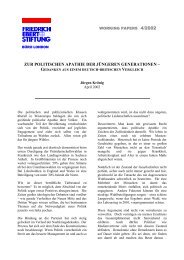Where Now for European Social Democracy? - Policy Network
Where Now for European Social Democracy? - Policy Network
Where Now for European Social Democracy? - Policy Network
You also want an ePaper? Increase the reach of your titles
YUMPU automatically turns print PDFs into web optimized ePapers that Google loves.
DOMINIQUE STRAUSS-KAHN 21avoid national regulation by delocalising. The territory of politicalregulation should become again the same as that of economics. Theglobalization of regulation should follow the globalization of theeconomy. In order to do this, we must put all our energy into theconstruction of Europe, which is alone in possessing the clout tobring about global regulation, partly through the construction ofinternational institutions. The state was the instrument of twentiethcentury social democracy. Europe should be our new horizon, and thelever of tomorrow’s social democracy.In this perspective, the current debates on the <strong>European</strong>Constitution are essential. ‘Technical Europe’, the entity that hascome into being since the Treaty of Rome in 1957, has been aremarkable instrument <strong>for</strong> the construction of the Single <strong>European</strong>Market. But it does not facilitate the construction of a socialdemocratic programme <strong>for</strong> Europe. This is, by definition, a politicalambition – and political institutions alone, responsible to <strong>European</strong>citizens, can put this into place. Whatever its weaknesses, the<strong>European</strong> Constitution marks the first founding step towards thispolitical Europe. It is urgent that all the <strong>European</strong> parties of the Leftmobilise to push <strong>for</strong> its adoption.We live in a period of transition towards a new political cycle. Onepolitical cycle is coming to a close: post-war social democracy. A newcycle is under construction: social democracy <strong>for</strong> the twenty-firstcentury.The world has changed – our political framework cannot remain thesame, anchored in the doctrine inherited from the Second World War.We are in ideological retreat; we are out of step with the politicaldemands of our fellow citizens, whom we offer policies that are notadapted to the rhythm of our times. This is the origin of the presentdemocratic crisis.This crisis is a fact, but it is not terminal. We have to respond tothe democratic challenge and work to rebuild our intellectualfoundations. We have to create a political project adapted to themutations of modernity, a vision of society capable of offering the keyto the future, a new identity that can face up to the fall of the oldcollective remedies. This perspective rejects the passive response to



